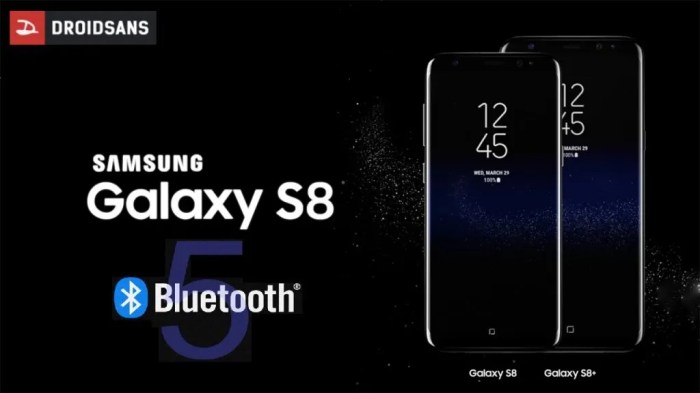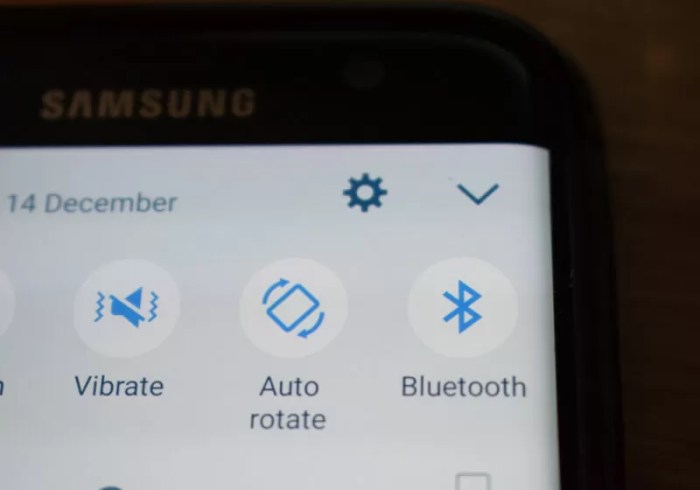Galaxy S8 Bluetooth 5 rumor: Was it all hype, or did Samsung secretly unleash a Bluetooth beast? This deep dive explores the whispers and the facts surrounding the Galaxy S8’s Bluetooth 5.0 capabilities. We’ll dissect the advertised features, compare it to rivals, and unearth any hidden potential lurking beneath the surface. Get ready to unravel the mystery!
From theoretical speed boosts to real-world performance, we’ll examine user experiences, technical specs, and long-term durability. We’ll also tackle those persistent rumors of unreleased features—were they just wishful thinking, or did Samsung hold back some seriously cool Bluetooth tricks?
Comparison with Contemporary Smartphones
The Galaxy S8’s Bluetooth 5.0 capabilities, touted as a significant upgrade at the time, deserve a closer look in the context of its competitors. Understanding how it stacked up against other flagship phones released around the same period offers valuable insight into its actual performance and the overall technological landscape of that era. This comparison considers both benchmark results and anecdotal evidence from real-world usage.
The introduction of Bluetooth 5.0 marked a notable advancement in speed, range, and data transfer capabilities. However, the real-world impact varied depending on the device’s implementation and other hardware factors. Therefore, a direct comparison with contemporaries is crucial to properly assess the S8’s performance.
Bluetooth 5.0 Performance Comparison with Contemporaries
Several flagship smartphones launched around the same time as the Galaxy S8 also incorporated Bluetooth 5.0. These included devices like the iPhone X, Google Pixel 2 XL, and OnePlus 5T. While direct, standardized benchmark tests specifically comparing Bluetooth 5.0 performance across these devices are scarce, anecdotal evidence from user reviews and tech publications suggests varying levels of performance. Factors like antenna design and software optimization played a crucial role in the overall user experience.
| Smartphone | Bluetooth Version | Notable Features/Performance | Real-World Observations |
|---|---|---|---|
| Samsung Galaxy S8 | 5.0 | Generally good range and speed; supported high-quality audio codecs. | Users reported stable connections and reliable performance with various Bluetooth accessories. Some noted slightly faster pairing than previous generations. |
| Apple iPhone X | 5.0 | Strong performance; known for stable connections. | Users consistently praised the reliability and seamless integration with Apple’s ecosystem. |
| Google Pixel 2 XL | 5.0 | Solid performance; emphasis on efficient power management. | Generally positive feedback, with users noting good battery life while using Bluetooth accessories. |
| OnePlus 5T | 5.0 | Competitive performance; focused on speed and responsiveness. | Users reported fast pairing and stable connections, although some occasional connectivity issues were reported in certain scenarios. |
It’s important to note that these observations are based on general user experiences and reviews, and individual results might vary due to environmental factors and accessory compatibility. A lack of standardized, widely-accepted Bluetooth 5.0 benchmark tests makes definitive quantitative comparisons challenging. However, the qualitative data suggests that the Galaxy S8 performed comparably to its contemporaries, offering a solid Bluetooth 5.0 experience.
Technical Specifications and Limitations: Galaxy S8 Bluetooth 5 Rumor
The Galaxy S8’s Bluetooth 5.0 capabilities, while a significant upgrade from previous generations, weren’t without their quirks. Understanding the specific chip used and its limitations helps paint a clearer picture of the overall user experience. Let’s dive into the nitty-gritty.
The Galaxy S8 utilized a Broadcom BCM4354 chip for its Bluetooth 5.0 functionality. While this chip offered the theoretical benefits of Bluetooth 5.0 – increased speed, range, and broadcasting capacity – the actual implementation in the S8 presented some challenges. These weren’t necessarily flaws in the chip itself, but rather compromises made in the overall device design and software integration.
Bluetooth 5.0 Chipset and Performance
The Broadcom BCM4354, while capable, wasn’t necessarily the most powerful Bluetooth chip available at the time. This meant that while the S8 could technically leverage the improvements offered by Bluetooth 5.0, the real-world performance gains weren’t always as dramatic as one might expect. For example, while the theoretical range increase was noticeable in optimal conditions, real-world usage often saw more modest improvements due to interference from other devices and environmental factors. The speed boost, similarly, was often limited by other bottlenecks in the system, such as the processing power dedicated to Bluetooth management.
Limitations and Their Impact on User Experience, Galaxy s8 bluetooth 5 rumor
One common complaint among Galaxy S8 users related to Bluetooth connectivity involved occasional dropouts or instability, particularly when connected to multiple devices or over longer distances. This wasn’t a consistent issue, but it was frequent enough to be a notable point of frustration for some users. The impact on user experience manifested in interrupted music playback, inconsistent connection with smartwatches, and occasional difficulties with hands-free calling. These issues were often more pronounced in environments with significant wireless interference.
Summary of Key Technical Aspects
The Galaxy S8’s Bluetooth 5.0 implementation, based on the Broadcom BCM4354 chip, offered theoretical improvements in speed, range, and broadcasting capabilities. However, real-world performance was sometimes limited by factors such as interference and system resource allocation. While generally functional, users occasionally reported connection instability and dropouts, impacting the overall user experience.
So, the Galaxy S8 and Bluetooth 5.0: a match made in tech heaven, or a slightly underwhelming pairing? While the advertised features delivered solid improvements, the lingering rumors add a layer of intrigue. Ultimately, the S8’s Bluetooth 5.0 performance sits firmly in the “good, not great” category. The real question is: did Samsung hold back anything truly groundbreaking, or was the hype simply ahead of the tech?
So, the Galaxy S8 Bluetooth 5 rumor’s heating up – imagine seamless, lag-free audio. But while you wait for that sweet, sweet connectivity, you might want to check out microsoft onenote now totally free for mac and pc , perfect for jotting down all those tech specs. Back to the S8 – Bluetooth 5 could totally change the mobile game.
 Insurfin Berita Teknologi Terbaru
Insurfin Berita Teknologi Terbaru

